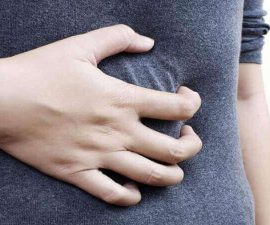… Continued …
The story could be tricky for paraesophageal hiatal hernia. In this type, the section that connects the esophagus and stomach (gastroesophageal junction) doesn’t slip into the chest and remains its normal position – but a part of the stomach slides upward and gets pinched between the diaphragm and gastroesophageal junction, making severe symptoms more likely. In other words, paraesophageal type is more likely to become severe if compared to sliding type.
However like all hernias, hiatal hernias (including sliding type) could also become incarcerated (trapped), leading to dangerous complication such as hernia strangulation.
Strangulation is the late stage of incarcerated hernia — immediate medical attention is required, otherwise it could be fatal. When part of stomach or/and gastroesophageal junction get trapped, this can cut off the blood flow to the affected area. If left untreated, you’re at high risk of developing serious complications such as the death of tissues, infection, and sepsis (blood poisoning).
Since the disease could cause serious complications, see immediate medical help if you have some of the following warning signs and symptoms:
- Difficulty swallowing. The hernia could be large enough to cause narrowing of esophagus, making it more difficult to swallow foods.
- Severe chest pain. Any pain in the chest should not be ignored, especially if it’s persistent or chronic. If the pain has to do with a hiatal hernia, it can be more painful when the hernia gets trapped.
- Gastrointestinal bleeding symptoms (e.g. chronic anemia, passing of stools that contain blood (black, tar-like stools), or vomiting of blood).
- Or if other symptoms of the condition (such as heartburn and acid reflux) get worse and don’t improve with usual medications.
Furthermore, some hiatal hernia symptoms are similar to those of heart problems. That’s why it’s also recommended to see your doctor promptly if you have heartburn accompanied by symptoms of heart problems (e.g. shortness of breath, dizziness, increased /irregular heartbeats, and palpitations) – in such a case, the symptoms may signal a heart disease rather than a hernia.
There are several things that make hiatal hernia get worse. These include being obese, continuing smoking, constipation, and poor diet. You might also like to read:
With comprehensive strategies, the disease is manageable and its complications are less likely to occur.




